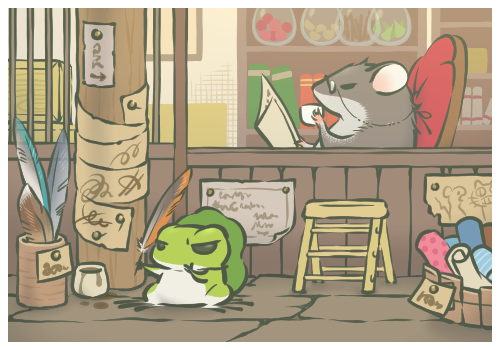Overseas Chinese students fall for 'Travel Fog'
By ZHANG RUINAN in New York | chinadaily.com.cn | Updated: 2018-01-30 05:52

A mobile game featuring a traveling frog has become a hit in China, especially among overseas Chinese students who say they feel emotionally attached to it because it reminds them of home.
The game is "Tabi Kaeru'', or "Travel Fog", created by the Japanese game company Hit-Point, and it's available only in Japanese. The company released the popular game Neko Atsume, or Kitty Collector, in 2014.
"Travel Fog" on Monday was still ranked first on a list of the most downloaded games from Apple's app store in China, according to Xinhua. The game also is being widely discussed on social media, where users post photos of their frog's adventures, sent to them by the frog. On the social media site Sina Weibo, the Chinese version of Twitter, the hashtag #TravelingFrog has so far garnered more than 300 million views.

In the game, players collect clovers that grow in the frog's garden so they can provide supplies – tents, bottles and other items – when the frog travels around Japan. Playing the game is free. The clovers cost $1 for 400. Food, for example, costs about 100 clovers.
When the frog leaves on a trip, it's unclear how long it will be gone. Sometimes it travels for hours or even days. When it returns, it provides snapshots and mementos of its journey.
According to an article last week in the Beijing News, the main reason for the popularity of the game could be due to similarities between young people in China and Japan today.
"A frog that lives and travels alone and has few interactions with others is actually a digital reflection of many young Chinese today who enjoy a less stressful and more self-reliant single life," which is kind of similar to young Japanese today, who also are single and who don't interact socially that much, the article said.

Chinese students overseas say the traveling frog reflects their feelings.
"Sometimes I feel the frog represents us — the overseas students; our parents prepared everything for us at home and once we left home, they can do nothing but wait for our messages through WeChat and expect us to go back every vacation," said Zhang Qiaoxin, a graduate student at New York University. "I'm going back home this spring break and will bring my parents some special food from New York as my frog does every time when he comes back."
"My frog has been away from home for two days, and I was so worried about him all the time," said Sara Lin, a 22-year-old graduate student at New York University. Like many other players, she calls the frog her "frog son" and shows postcards sent by the frog on the social media WeChat.
"I started to think whether they prepared enough food, or if my frog son is sleeping well," Lin said. "But it was only two days when he left home. I've been in the US for five years — suddenly I understand why my mother wants me to call her every day."

Lin said she used to call her mother once a week, but after she started playing the game, she tries to call every two days.
Linda Xu, who graduated from Columbia University last year and decided to work for a marketing company in New York, is also addicted to the mobile game.
"The most exciting part about this game is waiting for your frog to send you postcards from different places," Xu said. "I traveled to a lot of places around the US in the past two years, but I didn't send many photos to my parents and my grandmother, now I regret it and I will send more photos back next time when I travel."
























